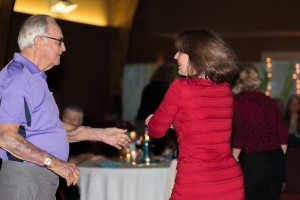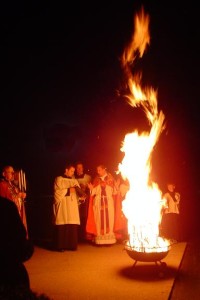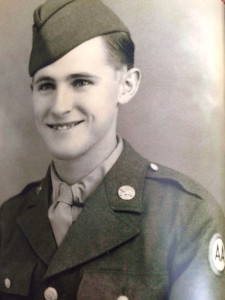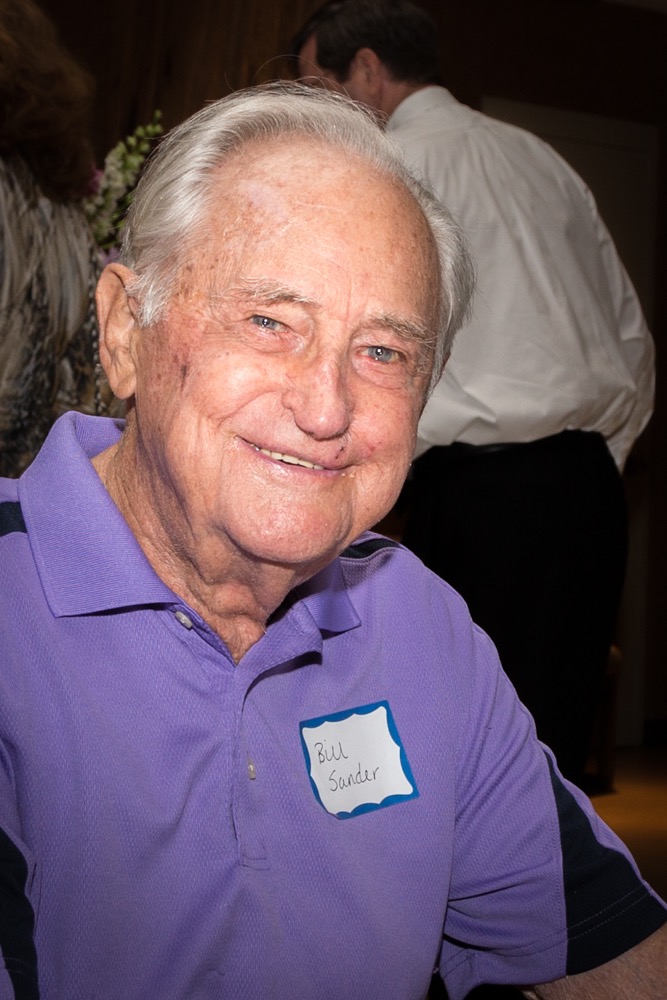Today is my dad’s 94th birthday. He is still alive, lives independently, (against our wishes) drives, (against our wishes) and, along with his companion Wanda, just placed very well in another bridge tournament. He called yesterday to tell me they had gone out to listen to live music downtown Winston-Salem and that they had tickets to the Little Theatre for Saturday night. Next week he will fly to Chicago to celebrate the graduation of his youngest grandchild. He can hardly stand to miss anything “family” and almost never does. Family first is his motto. I believe to this day that his motto came out of all that surrounded his immigration to America from Germany. His family survived the depression in Germany after WWI and landed in America in 1928, just in time for the Great Depression. Family was first if you were to survive. Dad went through high school in NYC, became a US citizen, and later served in the Army during WWII.
In 1950 Dad married my mom, amazing woman that she was. People are important, not things, was her motto. But today, and again on Sunday for Father’s Day, I want to remember what my dad has taught me, even though he would quickly say that mom was the real reason we all ended up so well.  As I remember my past, I am very aware of the good I have inherited, both genetically and through acculturation. I know the great risks my relatives took to make life in America happen. I know how to make a meal out of nothing. I know how to work hard and how to live within my means. I know how to show up for family events. I also know how to make fun that is free and to laugh until my sides hurt, sometimes even at myself. I learned to give back to my community in as many ways as feels appropriate, and I was pointed toward God as the center and compass for all things. Also, I have a great appreciation for America and for the sacrifice that my dad and his generation of men and women made in order to protect our freedom.
As I remember my past, I am very aware of the good I have inherited, both genetically and through acculturation. I know the great risks my relatives took to make life in America happen. I know how to make a meal out of nothing. I know how to work hard and how to live within my means. I know how to show up for family events. I also know how to make fun that is free and to laugh until my sides hurt, sometimes even at myself. I learned to give back to my community in as many ways as feels appropriate, and I was pointed toward God as the center and compass for all things. Also, I have a great appreciation for America and for the sacrifice that my dad and his generation of men and women made in order to protect our freedom.
Family first. (Dad) People are important, not things. (Mom)
Remembering the past is not just a sentimental activity. It is one way you can ground yourself and connect to your history and your roots. Even if you want to be, you are not disconnected from all that has already happened. You have not just been plopped into your present life with no connection to people, places, or things. You have a narrative, a story that can give your life much meaning. Perhaps the reason geneology has become such a popular hobby is due to the fact that people are wanting to know their story, their past… to feel connected to who they are. Your history, your story matters. It may not be finished yet but it still matters. Even the really messy stuff. Maybe especially the really messy stuff. Often it is clearly acknowledging the messes of the past that allows us to do something differently in the present and the future. We can change the cycles, of poverty, of abuse, of prejudice, of racism, of sexism only by acknowledging that they exist.
Remembering the past is not just a sentimental activity. Click To Tweet
I am a member of the Episcopal Church. Our most sacred service of the year is the Easter Vigil.  This service happens after sunset on the Saturday evening before Easter Sunday. It starts in the dark with a fire and the paschal candle is lit. It is a long service during which our “salvation history” is re-told through a series of Scripture readings. Generally it tells history from the creation to the binding of Isaac, through the flood, the Passover, and the Exodus, through a few of the prophets, and finally to the death and resurrection of Jesus. We remember our past, our narrative, because without remembering that history, the present story of Easter, the resurrection story, means very little. If the present is just floating out there with no connection to anything past, it usually makes no sense.
This service happens after sunset on the Saturday evening before Easter Sunday. It starts in the dark with a fire and the paschal candle is lit. It is a long service during which our “salvation history” is re-told through a series of Scripture readings. Generally it tells history from the creation to the binding of Isaac, through the flood, the Passover, and the Exodus, through a few of the prophets, and finally to the death and resurrection of Jesus. We remember our past, our narrative, because without remembering that history, the present story of Easter, the resurrection story, means very little. If the present is just floating out there with no connection to anything past, it usually makes no sense.
 Remembering our past is also important during this time of global unrest, political mud-slinging, and a general loss of civility. Who are we, as Americans? For many years a friend of mine has hosted a July 4th celebration that in many ways looks just like so many others: picnic tables, bbq, potato salad, American flags, and fireworks. What has made it different, though, is the yearly reading of the Constitution and the singing of our national anthem. We remember who we are and why we are celebrating. The July 4th holiday is a perfect time to re-read (or maybe for some read for the first time) the Constitution of the United States. Perhaps at least read the preamble. What are our guiding principles? What did our ancestors write about who we would be as a country?
Remembering our past is also important during this time of global unrest, political mud-slinging, and a general loss of civility. Who are we, as Americans? For many years a friend of mine has hosted a July 4th celebration that in many ways looks just like so many others: picnic tables, bbq, potato salad, American flags, and fireworks. What has made it different, though, is the yearly reading of the Constitution and the singing of our national anthem. We remember who we are and why we are celebrating. The July 4th holiday is a perfect time to re-read (or maybe for some read for the first time) the Constitution of the United States. Perhaps at least read the preamble. What are our guiding principles? What did our ancestors write about who we would be as a country?
Tribes, countries, states, cities, institutions, families, and friendships have histories that need to be remembered. The temptation is to only remember the good, to re-write history and make ourselves feel better about who we are and where we got started. This is not helpful. We need to acknowledge the raw, messy truths of our history along with the beautiful, marvelous truth. Half truths about our past are never helpful and can in fact be harmful.
We need to acknowledge the raw, messy truths of our history along with the beautiful, marvelous truth.
My training as a family therapist has taught me this: a secret will keep repeating itself until it is brought into the light. There’s no such thing as a family secret. This is a family therapy motto. Another teenager with a substance abuse problem? What is the history of this in the family? Another suicide? How many have there been? Another marriage suffering the consequences of infidelity? We don’t talk about Uncle Bernie. He was B-A-D, a client told me recently. Ok, but your son is acting out in the same way Uncle Bernie acted out. History is repeating itself, will repeat itself, until light is shed on this messy secret. Forgetting the past is not helping right now.
My youngest nephew is on a church trip to Eastern Europe this week. He wrote this in a blog post after a visit to Auschwitz. “For good or for bad, the things we do and the things we leave behind will influence the future generation and possibly the world” (Nick Sander). Nick is 18. I hope he will carve this memory into his heart. Thanks, Nick, for reminding us that remembering the past is one important way to change the future.
For good or for bad, the things we do and the things we leave behind will influence the future generation and possibly the world. –Nick Sander
What are the marvelous things about your past? Where are the messes? Acknowledge them both. Let the paradox of the messy and the marvelous weave a beautiful tapestry for you, a narrative that makes sense, a story that has a beginning and a middle and eventually an end.
So remember your past, remind yourself of your story, even the messy parts of it, because life is messy and life is marvelous.
Amy


Thanks for sharing, Amy. Glad to know your Dad is still enjoying life.
Hope you are too, Mary. Thanks for reading LiM2!
What a great story and how wonderful, Amy, to have your sharp and life-filled father still with you ! I believe that who we are today is a lot of how our past shaped us. Thanks for having the wonderful readable LiM2. Look forward to the next “issue.”
Thank you, Bonnie. We sure appreciate your reading LiM2!